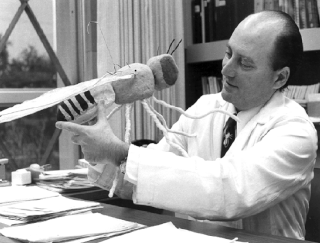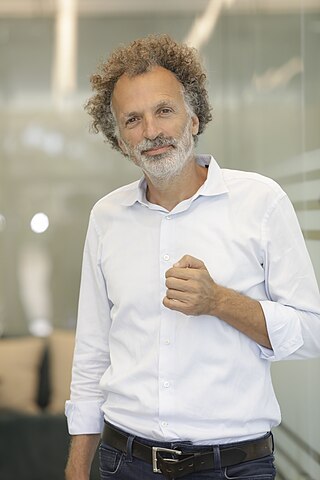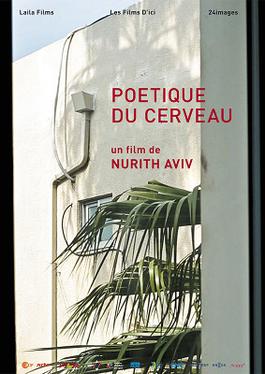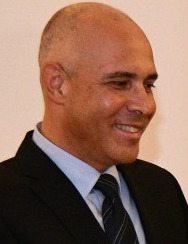Yadin Dudai | |
|---|---|
| Born | 8 December 1944 |
| Nationality | Israeli |
| Alma mater | Weizmann Institute of Science, California Institute of Technology |
| Known for | learning and memory |
| Scientific career | |
| Fields | Neuroscience |
| Institutions | Weizmann Institute of Science |
| Doctoral students | Joseph Buxbaum |
Yadin Dudai (born December 8, 1944) is a neuroscientist, Professor (emeritus) of Neurobiology at the Weizmann Institute of Science in Rehovot, Israel, and the Albert and Blanche Willner Family Global Distinguished Professor of Neural Science at New York University (NYU).
Dudai was born in Tel Aviv, Israel to a family most of which was murdered in the Holocaust in Lithuania and Poland.
After working as a professional journalist and news editor for a leading Israeli daily, and reading philosophy and middle eastern studies at Tel-Aviv University, he switched to study biochemistry and genetics, with supplements in modern history, at the Hebrew University of Jerusalem. He received his B.Sc. (with honor) from the Hebrew University and his Ph.D. from the Weizmann Institute of Science, where he studied protein chemistry and biophysics, and conducted his postdoctoral studies at the California Institute of Technology, [1] where he was on Seymour Benzer's team that pioneered the neurogenetic analysis of memory mechanisms. [2]
Over the years he has been a Scholar in Residence at the National Institutes of Health, and a visiting professor at Columbia University, Harvard University, Yale University, University of Edinburgh, Collège de France, Boston University, and New York University (NYU). [1] He served in a number of academic and public positions, including an advisor to the President of the State of Israel and to the National Council of R&D, a member of the Planning and Grants Committee of the Universities in Israel, Dean of the Faculty of Biology and Chair of the Department of Neurobiology and head of the Brain Research Centers at the Weizmann Institute of Science. He is also the Scientific Director of the Israel Center of Research Excellence (I-CORE) in the cognitive sciences.
Yadin Dudai's research interests encompass the neurobiology of learning and memory, memory as a concept and as a brain faculty, and the interrelationships among the two. He is also interested in collective memory, and in the evolution of 'cultural organs', such as the cinema.
He has contributed to our understanding of brain and behavioral mechanisms of learning and memory, particularly those related to the consolidation and persistence of the memory trace, and of the evolution and role of concepts of memory in science and culture at large.
Among the contributions made by Yadin Dudai and his coworkers: identification of the first learning mutant, using Drosophila, which was a critical proof of concept for the neurogenetic analysis of memory; discovery of consolidation in the fruit fly, rendering it amenable to genetic analysis and demonstrating the universality of consolidation; dissociation of the effect of single gene mutations on encoding vs. consolidation; elucidation of the molecular machinery of memory encoding, memory consolidation and experimental extinction in the mammalian neocortex, using taste associations as a model; discovery of the rule that guides stability of associative memories after their retrieval (the "dominant trace" model); and the data-driven hypothesis that consolidations linger long after they have been considered to end, accounting for ongoing changes in the stability and veracity of memory.
He has over 210 professional publications in the field of brain and memory. [1]
While he is mostly known for his work on learning and memory, he is also one of the founders of the field of neurogenetics of behavioural plasticity when he was in the group of Seymour Benzer.
Dudai received the IPSEN Prize 2013 for outstanding achievements in memory research, together with Richard Morris and Timothy Bliss. [3] He was elected member of EMBO in 2014 [4] and the same year became a member of the Israel Academy of Sciences and Humanities, of which he is chairing the Science Division since 2019. [5] In 2013, Dudai became a Fellow of the American Association for the Advancement of Science. [6]

Neuroscience is the scientific study of the nervous system, its functions and disorders. It is a multidisciplinary science that combines physiology, anatomy, molecular biology, developmental biology, cytology, psychology, physics, computer science, chemistry, medicine, statistics, and mathematical modeling to understand the fundamental and emergent properties of neurons, glia and neural circuits. The understanding of the biological basis of learning, memory, behavior, perception, and consciousness has been described by Eric Kandel as the "epic challenge" of the biological sciences.

Amir Pnueli was an Israeli computer scientist and the 1996 Turing Award recipient.

The Weizmann Institute of Science is a public research university in Rehovot, Israel, established in 1934, fourteen years before the State of Israel was founded. Unlike other Israeli universities it exclusively offers postgraduate-only degrees in the natural and exact sciences.

Seymour Benzer was an American physicist, molecular biologist and behavioral geneticist. His career began during the molecular biology revolution of the 1950s, and he eventually rose to prominence in the fields of molecular and behavioral genetics. He led a productive genetics research lab both at Purdue University and as the James G. Boswell Professor of Neuroscience, emeritus, at the California Institute of Technology.

Obaid Siddiqi FRS was an Indian National Research Professor and the Founder-Director of the Tata Institute of Fundamental Research (TIFR) National Center for Biological Sciences. He made seminal contributions to the field of behavioural neurogenetics using the genetics and neurobiology of Drosophila.

James L. McGaugh is an American neurobiologist and author working in the field of learning and memory. He is a Distinguished Professor Emeritus in the Department of Neurobiology and Behavior at the University of California, Irvine and a fellow and founding director of the Center for the Neurobiology of Learning and Memory.
Joseph E. LeDoux is an American neuroscientist whose research is primarily focused on survival circuits, including their impacts on emotions such as fear and anxiety. LeDoux is the Henry and Lucy Moses Professor of Science at New York University, and director of the Emotional Brain Institute, a collaboration between NYU and New York State with research sites at NYU and the Nathan Kline Institute for Psychiatric Research in Orangeburg, New York. He is also the lead singer and songwriter in the band The Amygdaloids.

Henry John Markram is a South African-born Israeli neuroscientist, professor at the École Polytechnique Fédérale de Lausanne (EPFL) in Switzerland and director of the Blue Brain Project and founder of the Human Brain Project.
Nahum Sonenberg, is an Israeli Canadian microbiologist and biochemist. He is a James McGill professor of biochemistry at McGill University in Montreal, Quebec, Canada. He was an HHMI international research scholar from 1997 to 2011 and is now a senior international research scholar. He is best known for his seminal contributions to our understanding of translation, and notable for the discovery of the mRNA 5' cap-binding protein, eIF4E, the rate-limiting component of the eukaryotic translation apparatus.

Neurogenetics studies the role of genetics in the development and function of the nervous system. It considers neural characteristics as phenotypes, and is mainly based on the observation that the nervous systems of individuals, even of those belonging to the same species, may not be identical. As the name implies, it draws aspects from both the studies of neuroscience and genetics, focusing in particular how the genetic code an organism carries affects its expressed traits. Mutations in this genetic sequence can have a wide range of effects on the quality of life of the individual. Neurological diseases, behavior and personality are all studied in the context of neurogenetics. The field of neurogenetics emerged in the mid to late 20th century with advances closely following advancements made in available technology. Currently, neurogenetics is the center of much research utilizing cutting edge techniques.
Memory consolidation is a category of processes that stabilize a memory trace after its initial acquisition. A memory trace is a change in the nervous system caused by memorizing something. Consolidation is distinguished into two specific processes. The first, synaptic consolidation, which is thought to correspond to late-phase long-term potentiation, occurs on a small scale in the synaptic connections and neural circuits within the first few hours after learning. The second process is systems consolidation, occurring on a much larger scale in the brain, rendering hippocampus-dependent memories independent of the hippocampus over a period of weeks to years. Recently, a third process has become the focus of research, reconsolidation, in which previously consolidated memories can be made labile again through reactivation of the memory trace.

Moshe Bar is an Israeli cognitive neuroscientist. He is a professor at Bar-Ilan University. He was previously head of the Gonda Multidisciplinary Brain Research Center at Bar-Ilan University and before that director of the Cognitive Neuroscience Laboratory at Harvard Medical School and Massachusetts General Hospital.
The NAS Award in the Neurosciences is awarded by the U.S. National Academy of Sciences "in recognition of extraordinary contributions to progress in the fields of neuroscience, including neurochemistry, neurophysiology, neuropharmacology, developmental neuroscience, neuroanatomy, and behavioral and clinical neuroscience." It was first awarded in 1988.

Memory is the faculty of the mind by which data or information is encoded, stored, and retrieved when needed. It is the retention of information over time for the purpose of influencing future action. If past events could not be remembered, it would be impossible for language, relationships, or personal identity to develop. Memory loss is usually described as forgetfulness or amnesia.
György Buzsáki is the Biggs Professor of Neuroscience at New York University School of Medicine.
Edwin "Ted" G. Abel is an American neuroscientist, and the founding Director of the Iowa Neuroscience Institute at University of Iowa and previously the Brush Family Professor of Biology at University of Pennsylvania.

Poétique du cerveau is a 66-minute 2015 French-German-Israeli French-, Hebrew-, and Italian-language independent underground experimental documentary art film directed by Nurith Aviv.

Wendy Suzuki is an American neuroscientist. She is a professor at the New York University Center for Neural Science. She is the author of Healthy Brain, Happy Life: A Personal Program to Activate Your Brain and Do Everything Better. Since September 1, 2022, she has served as Dean of the New York University College of Arts & Science.

Alon Chen is an Israeli neuroscientist and the 11th President of the Weizmann Institute of Science.